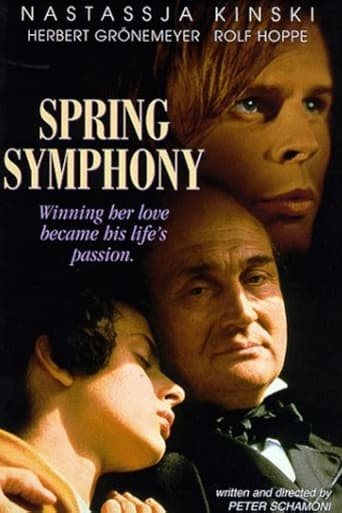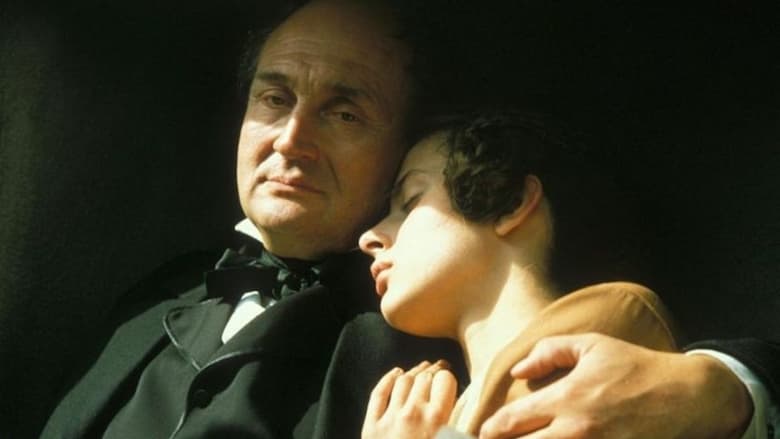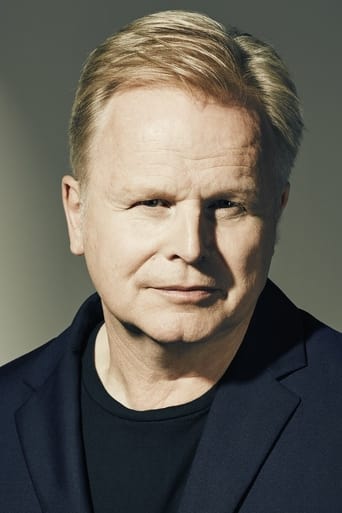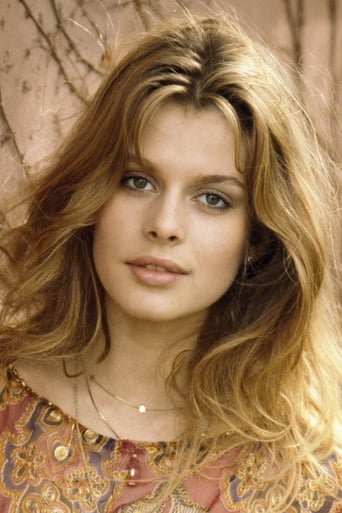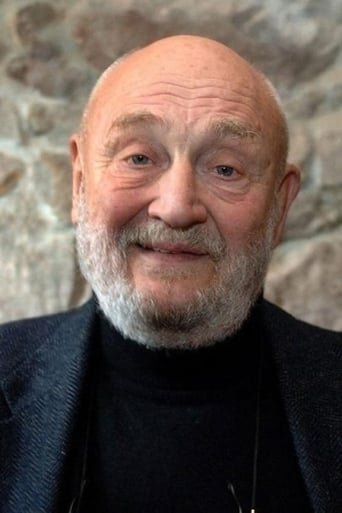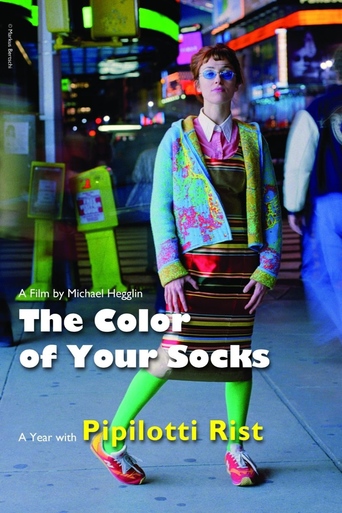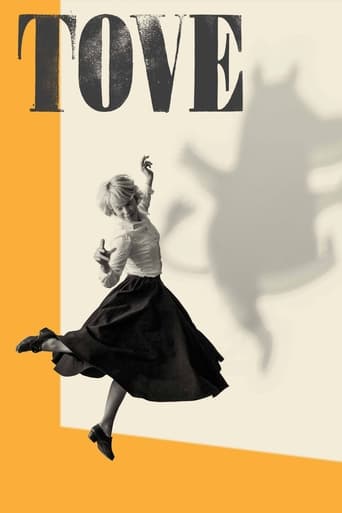Spring Symphony (1983)
"Spring Symphony" is the story of Robert Schumann and Clara Wieck. Both were music entities. Robert Schumann turns out to have been a second tier composer, if that, never rising to the heights of a Beethoven or Mozart. In contrast, Clara Wieck was a master technician in the playing of the piano, a composer (probably not at Schumann's level), and was a child prodigy.
Watch Trailer
Free Trial Channels
Cast


Similar titles
Reviews
Dreadfully Boring
I cannot think of one single thing that I would change about this film. The acting is incomparable, the directing deft, and the writing poignantly brilliant.
This is one of the few movies I've ever seen where the whole audience broke into spontaneous, loud applause a third of the way in.
A film of deceptively outspoken contemporary relevance, this is cinema at its most alert, alarming and alive.
"Frühlingssinfonie" or "Spring Symphony" is a West German German-language film from 1983. It was written and directed by Peter Schamoni and is among the filmmaker's most known works. The cast includes a couple big names too, such as Nastassja Kinski, Herbert Grönemeyer and Rolf Hoppe. This 105-minute movie is one of the defining films of Kinski's (daughter's) career as she won her only German Film award for her portrayal of Clara Wieck here, the partner of famous composer Robert Schumann (played by Grönemeyer). The good thing I can say about Kinski's performance here is that it is possibly the best thing about the film and she is certainly much much better than the limited Grönemeyer. But as the film is nothing special, neither is Kinski's performance and this film award honor may have been a bit too much. I also cannot say that this movie got me curious about Schumann or Wieck and what their lives were like. It felt like a very bleak, sterile film and all the parts when Schamoni tried to make an emotional impact, I must say didn't do a lot for me. So like I already wrote in the title of my review, I felt that this became a pretty forgettable watch. Maybe you need to be a big lover of either classical music, or of Schumann in particular to enjoy the watch here, but I just could not take it seriously in the face of Grönemeyer extremely weak portrayal and choosing the path of music may have been the best thing he could have done. I do not recommend the watch. Thumbs down.
Fruhlingsinfonie "Spring Symphony" (1983): Starring Nastassia Kinski, Herbert Gronemeyer, Rolf Hoppe, Andre Heller, Marie Colbin, Margit Geissler, Gidon Kemer, Inge Marschall, Kitty Matern, Uwe Muller, Peter Schamoni's 1983 German film "Spring Symphony" is an intimate, accurate portrayal of the relationship between two composers- Robert Schumann and Clara. It is a wonderful film, with fine acting by the leads Herbert Gronemeyer and Natassia Kinksi, who had been a model and would enjoy further success after this movie. The time is early 19th century (1830-1850)during the Romantic Era craze in classical music. Beethoven opened the gates to the new wave of music, which would be followed by Chopin and Franz Liszt, all mentioned in this film. Robert Schumann is portrayed here as a struggling artist, an idealist who lives from hand to mouth, more along the lines of Mozart. He gets romantically involved with the more wealthier and polished Clara Wieck whose father opposes their love. Even like this, Robert and Clara, who had become lovers through working together as composers, continue to defiantly engage in their relationship. Clara's father is brought to trial but in the end Clara and Robert are married. The film is accurate, and not highly dramatized or romanticized far from the truth. Filmed in Germany, Austria and France, the film follows the career of Schumann quite truthfully - i.e: the fact he was injured and his fingers were paralized and even as such played the piano quite well, his publication of a music magazine under the pen names of Eusebius and Florestan. Eusebius is his practical, balanced side while Florestan is passionate and free-spirited. A beautiful film. Natassia Kinksi plays a fine Clara, strong, independent, refined, romantic, soulful. The costumes and attention to detail are precise, captivating us and hooking us into a new world of historical romance.My favorite scenes are those romantic moments between Clara and Robert, the opening scene with Paganini playing a violin concerto with lightning speed, all the chamber music scenes and recitals Clara has and the finale in which finally, Clara and Robert have married and decide to open their own concert hall..Robert says "I hope this institution is big enough for two instruments" and I think he was referring to their marriage. The music is heaven. Conductor Wolgfang Sawallisch leads his orchestra in brilliant music by both Robert Schumann and Clara.
And who, might you ask, is Clara Wieck? Well, if she hadn't married Schumann, she might have been much more famous than he. Her pianist abilities were thought to be equal to or greater than those of Franz Liszt. I had the privilege of seeing this film in New York City in a small theater, subtitled. A friend of mine rented it and, unlike one of the posters, his film was dubbed in English. I am glad I got to see the German version.This is a beautiful film with a feminist bend to it, being the story of a brilliantly talented young woman exploited by her father and Schumann, who becomes her husband. Kinski is absolutely wonderful and beautiful. Also, her piano fingerings are great.There is an interesting line at the end, where Wieck says, talking about her home with Schumann, "I hope there will be room for two pianos." Of course there weren't, and she was forever known as Clara Schumann.The film doesn't go into the fact that Clara Schumann did have a career after marriage, however, and a good part of her relationship with her husband revolved around their mutual passion for music. She had 8 children but managed to compose and do concert tours, often with her husband, until he was institutionalized. After Schumann's death, with the help of Brahms, she continued to do concerts though plagued by various ailments.Try to see this film in German with subtitles if at all possible.
When I saw this dvd in the store, I was thrilled. Rushed home to watch it and was so surprised to find the entire movie in German with no choice of languages or subtitles. I looked the outside cover over many times and there is nothing anywhere indicating that it is in German. My two years of college German are not sufficient for me to follow the story line well.In spite of this language barrier, I thought the movie was well done and I enjoyed it very much. Hopefully, one of my friends who speaks German better than I will watch it with me and translate.

